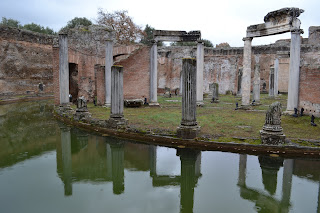On Friday, January 20, we were taken on a field-trip to the Villa Adriana, which is about 45 minutes Northeast of Rome. The day started out on a dismal note with as a slow rain tricked through the chilly air, as we all climbed onto the bus. However, by the time we arrived at the villa complex, the rain had slowed.
We bought our tickets and followed our professors, trudging through mud and a field before coming to anything that looked like a ruin. They had decided to lead us to the villa through what they said "was believed to be the private entrance to the villa." This "entrance" currently looks like a mud path through a field. Either way, I was glad I was one of the few who wore my hiking boots!
The Villa Adriana was the palace complex of Emperor Hadrian, during his reign between 117 and 138 AD. Unlike most emperors, he decided to not live in Rome, and instead moved his court to this country estate. He was highly interested in architecture, and thus designed the entire complex. He enjoyed experimenting with new architectural idea. He traveled all across the empire, and often Incorporated new architectural ideas from other cultures into the design of the estate. Therefore, the Villa Adriana is vary elaborate and complex in that it is a well organized collage of architectural ideas. The pictures below illustrate these ideas.
 |
| Detail of one of the capitals |
 |
| the arches and domes are everywhere |
 |
| one of the beautiful and elaborate mosaics |
 |
| The Maritime Theater (which wasn't actually a theater) |
 |
The Maritime Theater was actually an indoor mini island retreat
that the emperor used for privacy and to escape the palace life |
 |
| Another view of the Maritime Museum |
 |
| The Villa entrance wall |
 |
| More rooms |
 |
| The Palace Baths |
 |
| What remains of one of the domes in the baths |
 |
| More ruins |
 |
| The Canopus, which is a long reflecting pool leading to an open dining room at the end |
 |
The Canopus is believed to be influence by Egyptian design,
while the colonnade that once surrounded it was of Greek influence |
 |
| The water was pretty green |
 |
| The dining area was once filled with numerous fountains that flowed into the large pool |
 |
| Looking across the surrounding mountains |
 |
| Piazza D'oro |
 |
| The ruins of the throne room with the town of Tivoli in the background |
 |
| The basin to the left is believed to be a pool in which fish were raised for food |
 |
| More of the Canopus |
 |
| These caryatids, columns that take human forms, indicate the Greek influence on the design |
 |
| I really liked this place...can you tell |
 |
| I hiked up behind the dining area of the Canopus to see the back of the dome |























No comments:
Post a Comment